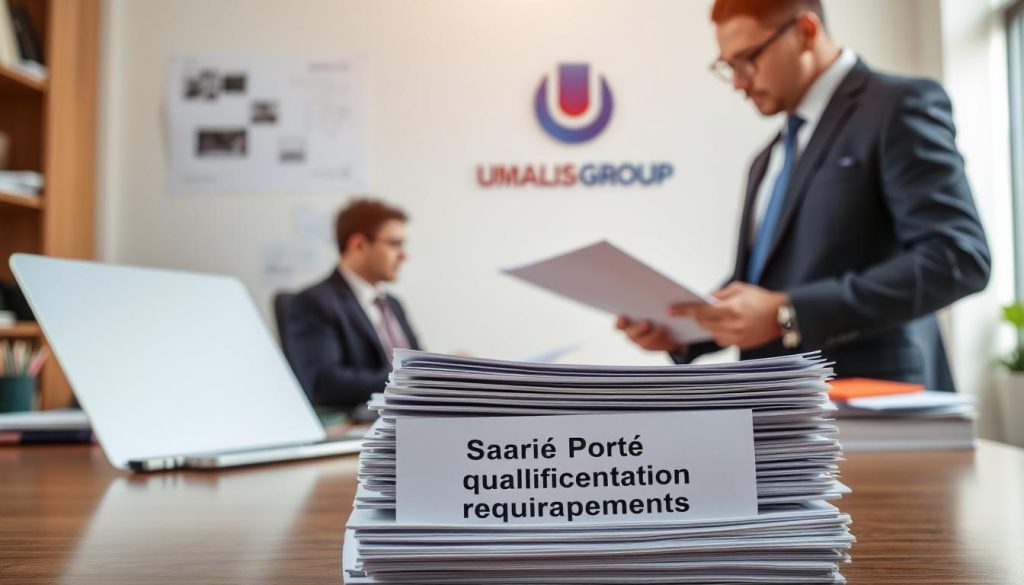Did you know that over 60% of new freelancers in France cite administrative complexity as their biggest fear when starting their independent career? Navigating the legal landscape can feel overwhelming, but there is a secure path forward.
The portage salarial framework offers a unique solution. It creates a three-way relationship between you, the independent professional, a specialized entreprise, and your end clients. This structure is formally recognized under French travail law.
This arrangement provides a remarkable blend of entrepreneurial freedom and employee security. You maintain control over your activité while gaining access to valuable social protections. A specific collective agreement has governed this statut since 2017, ensuring clear rules for all parties.
Our guide will walk you through this system. We explain the essential conditions and responsibilities for the salarié and the supporting société. Understanding these details is key to building a sustainable and protected freelance career in France.
Table of Contents
Key Takeaways
- Portage salarial is a legally recognized three-party employment model in France.
- It allows independent professionals to operate with entrepreneurial freedom while enjoying employee benefits.
- The system is governed by a specific collective agreement established in 2017.
- Key parties include the freelancer, the portage company, and the client.
- Understanding the legal framework is essential for compliance and career protection.
- This model helps mitigate the administrative burdens of starting a freelance business.
Understanding Portage Salarial: A Freelancer’s Guide
For qualified professionals navigating the French market, portage salarial represents an innovative employment solution. This framework creates a structured environment where you can thrive as an independent specialist.
Overview of the Portage Concept
The system operates through a three-party arrangement. As a salarié porté, you deliver specialized services to client companies. The entreprise de portage salarial handles your remuneration and administrative duties.
This model requires significant professional autonomy. You must actively seek your own clients and negotiate service terms independently. The contrat defines clear responsibilities for each party involved.
Benefits for Independent Professionals
You maintain complete control over your professional relationships and work organization. Meanwhile, the supporting société manages payroll, social contributions, and legal compliance.
This arrangement provides essential social protections typically available only to traditional employees. You gain access to health insurance, retirement benefits, and unemployment coverage.
The model particularly suits executives and specialists with established expertise. IT consultants, engineers, and management advisors often find this framework ideal for their professional needs.
Eligibility and Qualification Requirements for Salariés Portés

The salarié porté designation comes with specific eligibility criteria designed to ensure only qualified professionals can access this model. We want you to understand these requirements clearly before considering this employment framework.
French labor law establishes clear benchmarks for professionals seeking this status. The system prioritizes experienced individuals with demonstrated capabilities in their field.
Minimum Qualification Criteria
To qualify as a salarié porté, you must meet specific educational or experience thresholds. The Code du Travail requires either a level 5 professional qualification (equivalent to Bac+2) or at least three years of significant experience in your sector.
Your expertise represents more than formal credentials. It encompasses specialized skills and practical knowledge that enable you to evaluate professional situations and execute projects effectively.
The autonomy requirement means you can independently prospect for clients and negotiate contract terms. This ensures you maintain true professional independence while benefiting from the employment structure.
Most salariés portés are classified as cadre level professionals due to their specialized nature. The supporting entreprise will verify your qualifications before concluding any employment contract.
Contract Structures in Portage Salarial: CDD versus CDI
Your choice of employment contract within the portage framework directly shapes your professional journey. This decision balances mission flexibility against employment security, requiring careful consideration of your specific circumstances.
Key Differences between CDD and CDI
The CDD (contrat à durée déterminée) is a fixed-term agreement tied to a specific client prestation. It offers clear start and end dates corresponding to your mission completion. This contrat type provides project-based security with defined parameters.
Conversely, the CDI (contrat à durée indéterminée) establishes an ongoing relationship with your entreprise de portage. You maintain employment continuity while serving multiple clients. This arrangement offers greater stability between assignments.
Implications for Duration and Renewals
For CDD contracts, the maximum durée cannot exceed 18 mois, including renewals. You can renew twice, and extensions may add up to three additional mois. The Code du Travail mandates standard provisions like trial periods and end-of-contract indemnities.
Your written contrat must be provided within two business days. This ensures transparency regarding terms and conditions before you begin travail. Understanding these timelines protects your rights as a salarié porté.
While client companies might engage your services for up to 36 mois, your individual CDD with the entreprise remains subject to the 18-month limit. This distinction is crucial for planning your professional engagements.
Legal Clauses and Obligations in Portage Salarial Contracts

The legal framework surrounding your employment agreement in this tripartite model is meticulously defined by French labor law. We believe that a clear and comprehensive contrat de travail is your primary shield, ensuring transparency and protecting your rights from the very beginning of your mission.
Specific articles in the code du travail, namely L. 1254-15 and L. 1254-21, enumerate the mandatory clauses that must be present. Your contract’s foundation is its explicit designation as either a fixed-term (CDD) or indefinite-term (CDI) agreement within this specific framework.
Essential Contractual Provisions
Your agreement is logically divided into two core parts. The first details your relationship with the supporting entreprise. It must transparently outline your remuneration calculation, the 5% business introduction indemnity, management fees, and the process for expense reimbursement.
This section also confirms your professional qualifications and specifies the retirement funds you’ll contribute to. You have the right to know the identity of the entreprise‘s financial guarantor, providing an additional layer of security for your income.
The contract is not merely a formality but a vital instrument that defines responsibilities and provides clear recourse.
Adherence to the Code du Travail
The second part of your contrat focuses on the client prestation. It identifies the client company, describes the service, its duration, and the agreed-upon price. Crucially, it states the client’s responsibility for your health and safety conditions at the worksite.
These obligations, mandated by the code du travail, are designed for your protection. They ensure every salarié porté operates with a clear understanding of their rights and the responsibilities of all parties involved in the contrat travail.
Role and Responsibilities of Entreprises de Portage
The entreprise de portage salarial serves as your administrative partner, managing crucial legal and financial responsibilities. This specialized société operates under strict regulatory oversight designed specifically for your protection.
We want you to understand that these companies must meet rigorous standards before they can legally support professionals like you. This creates a foundation of trust and sécurité for your independent career.
Guarantee Financial Requirements
The garantie financière represents a critical protection mechanism for every salarié. This mandatory guarantee ensures your remuneration and social contributions are secure even if the company faces financial challenges.
French law requires this guarantee to equal at least 10% of the previous year’s payroll. The minimum amount is €92,736 for 2024. Only authorized financial institutions can provide this coverage.
| Guarantee Provider Type | Authorization Requirements | Coverage Scope |
|---|---|---|
| Mutual guarantee societies | Regulated financial status | Full remuneration protection |
| Insurance companies | Government authorization | Social contributions coverage |
| Banks and financial establishments | Central bank approval | Default scenario protection |
Exclusive Service Provision
Your chosen entreprise portage must focus exclusively on this activité. This exclusivity requirement prevents conflicts of interest and ensures dedicated expertise.
The company maintains individual activity accounts for all salariés. This transparency allows you to track financial flows and understand exactly how your earnings are managed.
These comprehensive protections mean you can concentrate fully on your professional services. The entreprise de portage handles the complex administrative burdens on your behalf.
Calculating Remuneration, Indemnité d’apport d’affaire and Financial Reserves
Understanding your earnings structure is crucial for assessing the financial viability of your freelance practice. We want you to feel confident about how your compensation is calculated and protected.
Salary Minimums and Calculation Methods
Your gross monthly rémunération is legally protected. The minimum montant for full-time work is €2,517.13. This ensures you receive fair compensation for your expertise.
Specific minimums vary by your status. Junior salariés portés (less than three years) receive at least €2,288.30. Senior professionals get €2,451.75, while those on forfait jours arrangements receive €2,778.65.
Your guaranteed monthly salaire combines three parts. It includes your base salary, paid leave indemnities, and the 5% indemnité d’apport d’affaire. This creates a comprehensive package.
The financial reserve system provides a safety net during transitions, ensuring you maintain stability even between client missions.
The indemnité d’apport d’affaire rewards your business development. You earn 5% of your gross monthly earnings for each client contract you secure. This recognizes your effort in finding clients.
A financial reserve offers security between assignments. For CDI contrats, 10% of your last mission’s base salary goes into your activity compte. CDD agreements include a 10% precarity indemnity at the end.
You receive full transparency each month. Detailed statements show client payments, management fees, expenses, deductions, and your net rémunération. This clarity helps you manage your finances effectively.
Managing Social Cotisations and Benefits
The comprehensive social protection system available through this employment model represents one of its most significant advantages for independent professionals. We want you to feel secure knowing you receive employee-level benefits while maintaining your entrepreneurial freedom.
Understanding Social Security and Unemployment Benefits
Your entreprise de portage salarial handles all cotisations sociales on your behalf. This includes health insurance, retirement plans, and occupational medicine services.
As a salarié porté, you benefit from assurance chômage. If you find yourself without client missions, you can claim unemployment benefits.
The system allows combining partial benefits with income from new travail. This supports your return to full professional activity without financial pressure.
You also access various formation opportunities. These include skills assessments and personal training accounts for ongoing development.
Frais de Gestion and Associated Charges
The frais de gestion represent the service fees for administrative support. Your entreprise provides complete transparency about these costs.
These fees cover payroll management, legal compliance, and social security administration. They appear clearly on your monthly account statements.
This arrangement ensures you build proper benefit entitlements while focusing on your professional emploi. The comprehensive protections create a secure framework for your career.
Navigating Risk, Safety and Contractual Protections
Operating on client premises introduces specific legal responsibilities that safeguard your professional practice. We want you to feel secure knowing that French law establishes clear protection frameworks.
Legal Safeguards for Freelancers
The entreprise cliente where you perform services bears full responsibility for your work environment. This includes all safety measures, health protections, and working time regulations during your assignment.
Your contrat must specify the personal protective equipment the client company provides. This ensures appropriate safety measures are in place before beginning your travail.
Professional liability coverage is arranged by your supporting entreprise. The agreement identifies the insurer and policy number protecting you against claims.
Legal restrictions prevent misuse of this framework. Client companies cannot use a salarié porté to replace striking workers during labor conflicts.
The system is expressly prohibited for personal service activities. This includes childcare, elderly care assistance, and domestic tasks in private homes.
| Protection Type | Responsible Party | Legal Requirement |
|---|---|---|
| Workplace Safety | Client Company | Equipment specification in contract |
| Liability Insurance | Portage Company | Policy details in agreement |
| Ethical Usage | Both Companies | No strike replacement allowed |
| Activity Restrictions | Legal Framework | No personal services permitted |
Violations carry significant penalties of €3,750 for both the entreprise cliente and portage company. These safeguards let you focus on delivering quality prestation with confidence.
We emphasize verifying compliance before beginning any service delivery. Ensure proper insurance coverage and client acknowledgment of safety duties.
Implementing Portage salarial et obligations légales in Your Freelance Practice
To effectively integrate this employment model into your professional routine, a systematic approach ensures long-term success. We guide you through establishing compliant practices from your initial client engagement.
Steps for Achieving Compliance
Your first critical step involves selecting the right support company. Research multiple providers to verify their financial guarantees and regulatory standing. Compare management fee structures carefully.
You maintain responsibility for business development and client negotiations. Create a strong professional value proposition and identify target companies. Prepare to discuss service conditions and pricing directly.
Once you secure a client opportunity, formalize the arrangement through a proper employment agreement. This document should include all legally mandated clauses covering your relationship and specific mission details.
Integrating Best Practices into Daily Workflow
Establish disciplined activity reporting practices. Document your work performed and track deliverables consistently. Submit monthly reports to your support company as contractually required.
Monitor your activity account regularly. Review statements to verify payment receipts and remuneration accuracy. Understand deductions for social charges and management fees.
Maintain thorough professional documentation including client correspondence and service records. This creates an audit trail that supports your reports and protects all parties involved.
Successful practice combines entrepreneurial client development with disciplined administrative compliance. This balance allows you to function independently while benefiting from the secure employment framework.
Key Considerations for Client and Mission Management
Successful mission management hinges on your ability to distinguish between legitimate project needs and prohibited staffing situations. We guide you through establishing professional boundaries that protect your independent status.
Establishing Clear Client Expectations
When engaging with an entreprise cliente, position your service as specialized expertise. Clearly define the mission scope and deliverables from the outset.
Your activité must represent either occasional tasks outside the client’s normal operations or specialized expertise they lack internally. This distinction ensures compliance with Article L. 1254-3 of the Labor Code.
Establish communication protocols covering work conditions, reporting requirements, and safety responsibilities. The client company bears full responsibility for your work environment during the prestation.
Managing Mission Duration and Scope
Mission durée should genuinely correspond to the client’s specific need. While a client can use your services for up to 36 mois, individual CDD contracts cannot exceed 18 mois.
This distinction is crucial for planning longer-term relationships. Avoid artificially extending engagements beyond legitimate project requirements.
You maintain flexibility to work with multiple clients simultaneously under a CDI arrangement. This diversification strategy reduces dependence on any single entreprise cliente relationship.
Conclusion
The journey through portage salarial offers a unique blend of entrepreneurial spirit and employee safeguards for today’s independent worker. This framework provides the essential balance between professional freedom and employment security that so many qualified professionals seek.
Since the 2017 collective convention established clear guidelines, this statut has offered cadre professionals a structured pathway. Your activité benefits from comprehensive legal protections while maintaining your professional autonomie. The tripartite relationship ensures proper gestion of your emploi.
As a salarié within this system, you gain access to vital social benefits through your chosen entreprise. This model represents a sustainable approach to independent work in France. It combines the flexibility you need with the stability required for long-term career success.
FAQ
What is the main legal difference between a standard freelance contract and a portage salarial contract?
The primary legal distinction is your employment status. Under portage salarial, you sign a formal employment contract (CDD or CDI) with the portage company, making you a salaried employee for legal and social security purposes. This provides access to full employee benefits and protections under the French Labor Code, unlike traditional freelance work.
Am I eligible for portage salarial if I already have my own business or EURL?
Typically, no. The portage salarial status is designed for independent professionals who do not have a commercial structure. Having an existing company like an EURL usually creates a conflict, as the portage framework requires an exclusive employment relationship with the portage company for your professional activities.
How does the indemnité d’apport d’affaire (business contribution fee) work?
This is a key financial component. It is a portion of your remuneration set aside by the portage company from the rate negotiated with your end-client. This fee covers the company’s operational costs, including your salary, employer social contributions, administrative fees, and the mandatory financial reserve. The exact percentage should be transparently detailed in your contract.
What are the legal obligations of the portage company towards me as a salarié porté?
The portage company has significant legal duties. They must provide a compliant employment contract, guarantee payment of your salary even if the client is late, manage all social security contributions, provide payslips, and maintain a financial guarantee to protect your earnings. They are also responsible for ensuring the entire arrangement adheres to the Code du Travail.
Can a portage salarial contract be terminated early?
Yes, but the conditions depend on your contract type. A CDI (permanent contract) follows standard employment termination rules, which may include a notice period. A CDD (fixed-term contract) generally cannot be terminated prematurely by the employer without a serious cause, offering you strong job security for the mission’s duration. Early termination by you may have specific clauses outlined in your agreement.
What social security benefits am I entitled to as a salarié porté?
You are entitled to the full range of benefits available to any French employee. This includes comprehensive health insurance (sécurité sociale), pension accrual, unemployment benefits (under specific conditions), and paid leave. Your coverage is based on the salary declared by the portage company, which is calculated from your professional income.
How is my net salary calculated after all deductions?
Your net salary is calculated from the total revenue generated from your mission. The portage company deducts the employer’s social contributions, the frais de gestion (management fees), and the amount allocated to the financial reserve. The remainder is then subject to standard employee deductions to arrive at your net pay, which must always meet or exceed the legal minimum wage (SMIC) for the hours worked.





